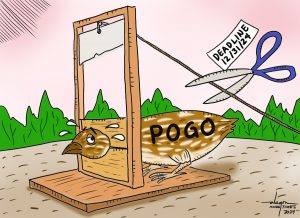By Herman M. Lagon
But what are the possible solutions to this “lagay” (bribe or grease money) and “palakasan” (favoritism, including nepotism, its subset) social epidemic? Strict anti-corruption laws, transparent hiring practices, merit-based recruitment processes, whistleblower protections, and regular audits of hiring activities, among others, can stand as the bulwark against this rising contagion. They all foster a culture of integrity and accountability, ensuring that each employee, from the janitor to the chief, knows the value of honesty and hard work.
And yes, it is a great challenge. Turning to international perspectives, one finds that the struggle against nepotism and its cousin, bribery, is universal. Countries like Brazil and the United States have tackled the issue head-on with legislation and stringent enforcement. Yet, even these measures could be better, as evidenced by scandals that slip through the cracks. It serves as a reminder that vigilance must be perpetual in the public sector hiring process.
Yet, there is hope. Every time a qualified teacher is hired over a favored relative or a health worker is chosen for their skill and not their surname, the system inches closer to fairness. The challenge lies in not just crafting the laws but in living them, making meritocracy not an exception but the norm.
Imagine this. A woman who landed a job at the city hall based purely on her exam scores and interview performance. Her hiring resulted from a newly implemented computerized system, eliminating human biases and ensuring fair play. Then there is this janitor in a government office whose promotion to a supervisory level resulted from years of hard work, not backdoor deals. His rise through the ranks is a testament to a system that rewards diligence.
A young tax officer named Marco was recognized for his refusal to accept any liability, upholding his duties with unwavering honesty. His commitment to integrity has become a benchmark for his colleagues and a beacon for his community. In a local health clinic, the most skilled nurse was rightfully appointed head nurse based on clear-cut criteria and her exceptional service record, proving that capability can and does get recognized.
A small barangay made headlines when it employed a transparent, community-involved selection process for its new treasurer, ensuring that the most honest and qualified candidate was chosen, not the most connected. When the Department of Education needed new teachers, they held open, competitive exams and public interviews. The top scorers were hired based on reliable rubrics and a fair selection process, reflecting a true meritocracy that students and parents could believe in.
At the Bureau of Customs, a long-standing bastion for “lagay,” a new director implemented a zero-tolerance policy on bribes. This resulted in a commendable increase in proper customs collections, a decrease in smuggling activities, and a pruning of corrupt personnel in the team. The Philippine National Police, often marred by the image of “palakasan,” launched a program that fast-tracked promotions for officers who demonstrated exceptional bravery and service, not for those who knew someone at the top.
A government-funded scholarship program for underprivileged youth was launched, and recipients were selected based on financial need and academic excellence, not by their family’s name or political affiliations. During a typhoon relief operation, the distribution of aid and hiring of paid force multipliers were monitored by civil society groups, ensuring that help reached those in need, not just those with political clout or family ties to local officials.
In the provincial government, a whistleblower policy was established, protecting and rewarding those who expose corruption, effectively deterring would-be perpetrators of “lagay” and bribery in the hiring, training, firing, bidding, procurement, and other vital processes. An online portal for public job postings was created, where all applications are logged and processed through a centralized system, allowing for equal opportunity and transparency, demonstrating the power of technology in combating nepotism.
These are all possible narratives that could happen regularly in our government offices. But we cannot have an overnight transformation. It requires the concerted effort of a nation, from the barrios to the boardrooms. It means changing mindsets, altering traditions, and sometimes, standing alone against a tide of opposition. But the Filipino spirit is nothing if not resilient.
Let this not be the end but the beginning of a conversation and the realization of our hopeful imaginations. Let it be a call to action for every reader to become a guardian of integrity. Despite the expected opposition from those in power and those who benefit from the shenanigans of the powers-that-be, let us be the generation that clears the path for true talent, skills, expertise, and dedication to thrive, for, in the end, a nation’s greatest asset is not its resources but its people, hired not for their last name, connection, or “lagay,” but for their ability to make the country not just strive and survive, but thrive and flourish.
***
Doc H fondly describes himself as a ‘student of and for life’ who, like many others, aspires to a life-giving and why-driven world that is grounded in social justice and the pursuit of happiness. His views herewith do not necessarily


